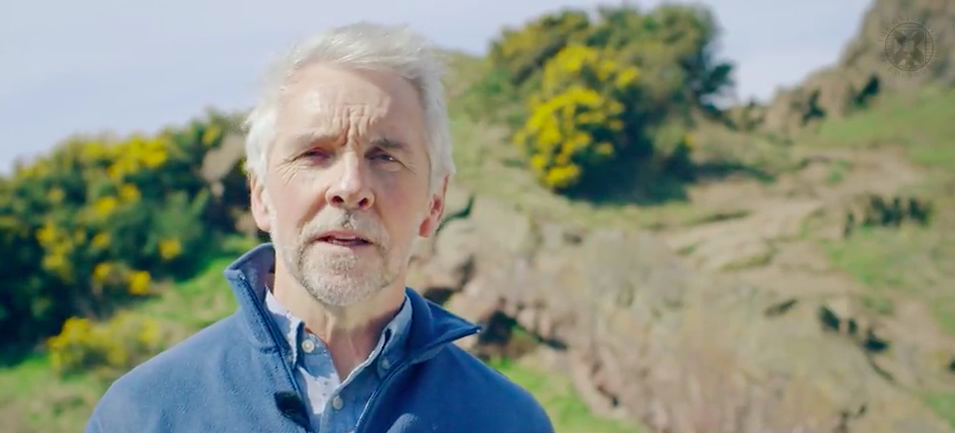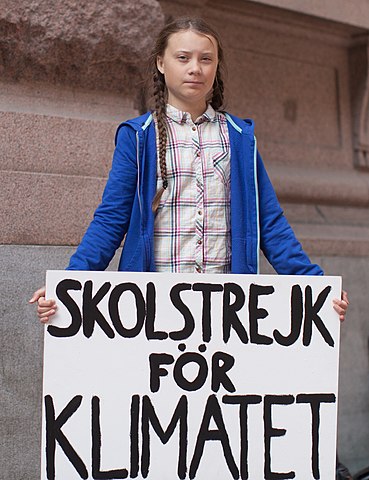‘Citizens in waiting’ – climate strikes and caring for our planet

Peter Higgins, Professor of Outdoor & Environmental Education, Director of the Global Environment & Society Academy and Director of Learning for Sustainability Scotland shares his views on education and the recent school climate strikes.

Greta Thunberg
On Friday, as she did the Friday before and will do the Friday after, 16-year-old school pupil Greta Thunberg stood outside the Swedish parliament to demand action on climate change. Following her lead, on 15 March, the biggest ever demonstration urging action on climate change – 1.4 million globally – took place, led by school children from around the world. I joined about 3,000 of those outside the Scottish Parliament, and I confess to shedding a few tears – yes, because these young people were urging action on the biggest issue our species has ever faced, but also because they had found their ‘voice’ – as citizens, and demanded to be heard. Too long have we considered those at school (paradoxically, whatever their age) as ‘citizens in waiting’, who can only have a political voice in elections, variously at 16 or 18 depending on where they are and what the ballot concerns. With climate change, and other environmental issues (such as the appalling and increasing global loss of biodiversity) we must pay heed. They tell us truths we are too preoccupied to address, too greedy to accept, or perhaps too embarrassed to discuss.
The all-too-brief press coverage this has garnered has resulted in a clamour of praise for these young citizens (and some harsh criticism and insults along the way). I believe they are worthy of praise, and we should be inspired by them. But mostly we should be embarrassed – embarrassed that it takes lessons from school children to spur adults into action on climate change, embarrassed that they have to help us to grow up whilst they should be still enjoying their youth.

Climate Strike outside Scottish Parliament, Friday 15 March
These young people are engaged in an inspiring civic act, and as they proceed, the adult community should not merely support them, we should be doing all we can to address sustainability (in the true sense – for all species, forever) in our personal and professional lives, and through civic engagement. We know this not easy, and the changes we need to make cannot be implemented in a day, but every day’s delay makes the scale of the task greater. As Greta herself has said:
“The changes required are enormous and we must all contribute to the solutions.”
These changes will need to be political, social and economic, but in all regards these need to be informed by accurate information and critical thinking skills that lead to understanding of the complex interdisciplinary nature of the problems we, and the planet face. We need to encourage, respect and cherish the capacity to care and act, whatever age our citizens are – and from the early-years to 18 (and I would argue in Further and Higher Education too) that is a central role of education.
We are fortunate that the Scottish Government has made Learning for Sustainability an entitlement of all learners and responsibility of all teachers – and uniquely in Scotland, this requires time spent in the natural world. There is ever stronger research evidence of the benefits of interaction with the natural world – in terms of health, wellbeing and physical activity, but also in terms of learning and attainment. However, arguably the power of the natural world (even small areas of land in urban settings) is of primary importance, as it sensitises all of us to the complex beauty of nature, and with a bit of help, to understand that it sustains us. If we are in any doubt about that all we need to do is reflect on where our food and water comes from, but even more crucially, the oxygen we breathe from the recycling of the CO2 we exhale (and our use of fossil fuels) by plants. This should be a fundamental part of the way we teach our children, so that they can understand and care for the planet in a way which we have not. Indeed, this approach has recently been endorsed by over 15,000 scientists (I was one!) in the ‘World Scientists’ Warning to Humanity: A Second Notice’ which amongst its 13 recommendations to counter global threats to sustainability and biodiversity urges “increasing outdoor nature education for children as well as the overall engagement of society in the appreciation of nature”. In short, the need is undeniable and the benefits enormous – we need to get out more!
Whilst this is clearly important for early-years, there is strong evidence that such experiences are important for all ages. Whilst this is fully supported by national education policy, few children benefit from such opportunities. Scotland has an internationally respected reputation for outdoor learning, and this needs to be consolidated with integrated, progressive experiences throughout schooling and beyond, as it is clear that this brings a wide range of health, developmental and educational benefits throughout life. These themes are central to the work of my colleagues and I in the University’s Moray House School of Education. Our ‘Outdoor, Environmental and Sustainability Education’ teaching, on campus, around the city and in a range of locations across the Highlands of Scotland, our research and knowledge exchange activities and our policy engagement with the Scottish Government and others are all aligned to this purpose.
Action on climate change and biodiversity loss needs to happen right now – and should be tackled together, say champions of the natural climate solutions approach. It also need to be taught at a level way beyond early years education. So, I was delighted to see the recent article by Global Environment, Politics and Society MSc student, Morven MacEwen. Students of all ages are right to be supporting the climate strikes, but they should not be expected to do so alone – they have every right to expect the wholehearted support of their teachers and lecturers.
Our young people shouldn’t have to address the twin impacts of our historic failure to act to address sustainability at the same time as they will need to learn to live with and adapt to the growing challenges of doing so. Nor should they have to miss school to remind us of our obligations, and that it is morally indefensible to pass on problems we have caused to future generations. We will not do so simply by educating children outdoors. However, children have a natural affinity with nature, and natural systems can help heal the damage we have inflicted on the planet – working with children in and about and for nature, is a profoundly important and positive step in doing so – and best of all – it is fun and joyful – and it is not just the kids who need a dose of that!
Related links:





Well said Pete! I attended the student climate strike in Melbourne
recently and was inspired and impressed. The thousands of young (
and some older) people who attended were determined, focused and
understood the issues. Sadly that is more than I can say for some
of our politicians.
Couldn’t have said it better myself.